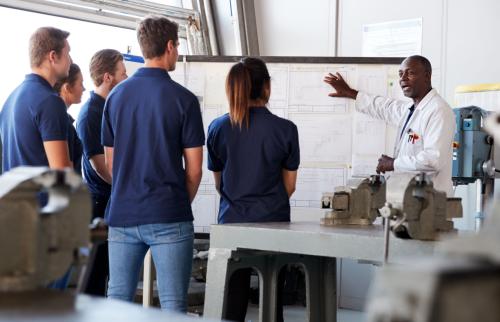Thirty years ago, some futurists predicted that the restructuring of the American economy and our technological advances would free and un-anchor us from place, precipitating a mass de-urbanization throughout the nation.
Well, they were wrong. The opposite has occurred.
Big forces have reconfirmed the primacy and centrality of place.
Far from being dead, cities are experiencing a second life-fueled, in part, by their distinctive physical assets-mixed use downtowns, pedestrian friendly neighborhoods, adjoining rivers and lakes, historic buildings, and distinctive architecture.
An astonishing 83 percent of our population lives in metropolitan areas which, together, drive and dominate the economy and house our wealth-generating industries, our centers of research and innovation, our ports of commerce, and our gateways of immigration.
The American economy has evolved into a series of clusters-networks of firms that engage in the production of similar products and the provision of similar services. And firms within these clusters crave proximity-to pools of qualified workers, to specialized services like legal or finance that often require face-to-face interaction, to infrastructure that enables mobility of people and goods, to other firms so that ideas and innovations can be rapidly shared.
Density-the essence of urban places-matters even more in the knowledge economy than it did in the industrial economy.
But for all their assets and dominance, our leading metros cannot solve their myriad challenges or leverage their boundless opportunities by themselves; they need the support of higher powers, national not divine, in order to thrive and prosper over the long term.
If metros are going to grow high-road, productive economies, we need strategic federal and state investments in science and technology, advanced research, and innovation as well as support for business growth, particularly small businesses: skills training, health care, capital access, and entrepreneurial support.
If metros are going to grow in sustainable ways, we need smart federal and state policies on transportation, housing, land reclamation, brownfield remediation, and energy efficiency… and a market shaping commitment to environmental sanity that reduces our carbon contribution to climate change.
If metros are going to grow a strong middle class, we need a federal and state commitment to improve access to quality education at all levels, enhance skills, supplement incomes, reduce the prices of being poor and ultimately grow assets and wealth.
As we approach the 2008 presidential election, the United States needs a national agenda-a Blueprint for National Prosperity-to give cities and metros the rules and the tools to leverage their economic strengths, grow in environmentally sustainable ways and build a strong, diverse and resilient middle class.
This Blueprint must respect the central lesson of our time: that the ability of our nation (or any advanced nation) to compete globally and meet the great environmental and social challenges of our time rests largely on the health and vitality and prosperity of major cities and metropolitan areas.
We are, in short, a full-fledged “Metro Nation”; it is high time to start acting like one.
Related Content from Opportunity 08 ![]()
Opportunity 08
 Opportunity 08 is a project of the Brookings Institution in partnership with ABC News. To help broaden the discussion of America’s policy challenges, policy forums and information will be featured on the ABC News website and on ABC News Now, which provides live 24/7 news coverage online, on television and on mobile devices. The material will also be featured on the project website, www.opportunity08.org.
Opportunity 08 is a project of the Brookings Institution in partnership with ABC News. To help broaden the discussion of America’s policy challenges, policy forums and information will be featured on the ABC News website and on ABC News Now, which provides live 24/7 news coverage online, on television and on mobile devices. The material will also be featured on the project website, www.opportunity08.org.



Commentary
Op-edA Blueprint for National Prosperity
June 21, 2007